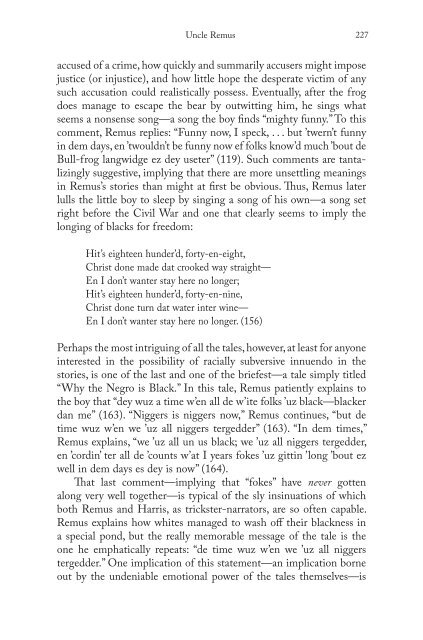Blooms Literary Themes - THE TRICKSTER.pdf - ymerleksi - home
Blooms Literary Themes - THE TRICKSTER.pdf - ymerleksi - home
Blooms Literary Themes - THE TRICKSTER.pdf - ymerleksi - home
You also want an ePaper? Increase the reach of your titles
YUMPU automatically turns print PDFs into web optimized ePapers that Google loves.
Uncle Remus 227<br />
accused of a crime, how quickly and summarily accusers might impose<br />
justice (or injustice), and how little hope the desperate victim of any<br />
such accusation could realistically possess. Eventually, after the frog<br />
does manage to escape the bear by outwitting him, he sings what<br />
seems a nonsense song—a song the boy fi nds “mighty funny.” To this<br />
comment, Remus replies: “Funny now, I speck, . . . but ’twern’t funny<br />
in dem days, en ’twouldn’t be funny now ef folks know’d much ’bout de<br />
Bull-frog langwidge ez dey useter” (119). Such comments are tantalizingly<br />
suggestive, implying that there are more unsettling meanings<br />
in Remus’s stories than might at fi rst be obvious. Th us, Remus later<br />
lulls the little boy to sleep by singing a song of his own—a song set<br />
right before the Civil War and one that clearly seems to imply the<br />
longing of blacks for freedom:<br />
Hit’s eighteen hunder’d, forty-en-eight,<br />
Christ done made dat crooked way straight—<br />
En I don’t wanter stay here no longer;<br />
Hit’s eighteen hunder’d, forty-en-nine,<br />
Christ done turn dat water inter wine—<br />
En I don’t wanter stay here no longer. (156)<br />
Perhaps the most intriguing of all the tales, however, at least for anyone<br />
interested in the possibility of racially subversive innuendo in the<br />
stories, is one of the last and one of the briefest—a tale simply titled<br />
“Why the Negro is Black.” In this tale, Remus patiently explains to<br />
the boy that “dey wuz a time w’en all de w’ite folks ’uz black—blacker<br />
dan me” (163). “Niggers is niggers now,” Remus continues, “but de<br />
time wuz w’en we ’uz all niggers tergedder” (163). “In dem times,”<br />
Remus explains, “we ’uz all un us black; we ’uz all niggers tergedder,<br />
en ’cordin’ ter all de ’counts w’at I years fokes ’uz gittin ’long ’bout ez<br />
well in dem days es dey is now” (164).<br />
Th at last comment—implying that “fokes” have never gotten<br />
along very well together—is typical of the sly insinuations of which<br />
both Remus and Harris, as trickster-narrators, are so often capable.<br />
Remus explains how whites managed to wash off their blackness in<br />
a special pond, but the really memorable message of the tale is the<br />
one he emphatically repeats: “de time wuz w’en we ’uz all niggers<br />
tergedder.” One implication of this statement—an implication borne<br />
out by the undeniable emotional power of the tales themselves—is

















